Baby Acne vs Herpes: How to Tell the Difference
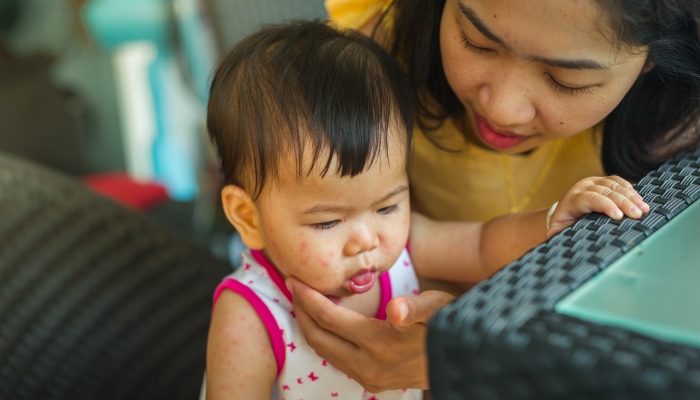
- Babies under 6 weeks old commonly have acne.
- Babies get herpes from contact with other people or during vaginal birth.
- Herpes infections are dangerous for babies and can be fatal.
- Call your doctor if your baby shows any new rashes or blisters, especially if you have recently had a cold sore.
Newborns have sensitive skin that can easily become inflamed. Baby acne, herpes, eczema, and other common skin conditions all cause redness and irritation on the skin. Since treatment of neonatal herpes and neonatal acne are very different, it’s important to know what’s causing the inflammation.
If your newborn has neonatal herpes, you’ll need to seek medical care for them right away. This article will help you understand how to tell the difference between baby acne and herpes.
Can Babies Have Acne?
Yes, babies can have acne. Most cases of acne in newborns appear on their nose, chin, and cheeks. Neonatal acne can look similar to other skin conditions. Eczema, heat rash, and baby acne can be difficult to distinguish from each other.
Causes of acne in babies
Most baby acne is caused by hormonal changes. Babies still have a lot of their mothers hormones circulating in their body. These high hormone levels can cause sensitive newborn skin to break out in acne.
Baby products can also cause neonatal acne. Newborn skin is extremely sensitive and easily irritated.
Statistics for acne in babies
Neonatal acne occurs in about 30% of babies under 6 weeks old. Infantile acne, which is acne in babies over 6 weeks old, is less common. Only about 2% of babies develop infantile acne.
Treatment for acne in babies
Most baby acne will heal with time. Usually, infant acne improves in a few weeks to months. But occasionally, baby acne can last for one year or more.
Acne in babies 6 weeks or older is uncommon. If your older baby has acne, they may need to see a dermatologist. There are currently no approved medications for your baby’s acne.
Follow these steps to care for your baby’s skin:
- Do not pick at baby acne or try to pop a baby’s pimple.
- Avoid scrubbing your baby’s face.
- Only use skincare products approved by a dermatologist.
- Wash your baby’s face with warm water .
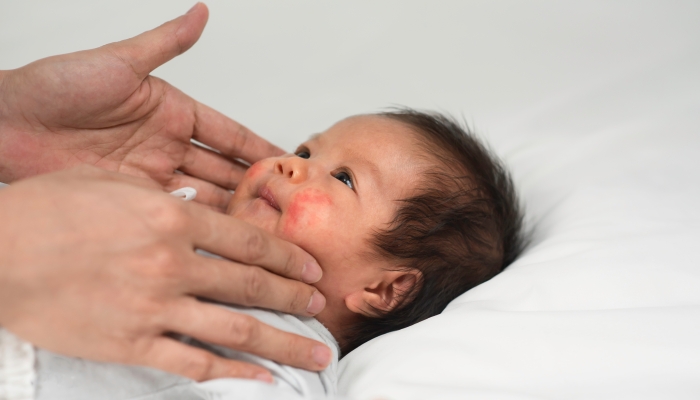
How Do Babies Get Herpes?
Babies get herpes from their caregivers.
Herpes is one of the most highly contagious skin conditions. It typically spreads through skin-to-skin contact. Most people are infected with herpes simplex virus type 1 when they are children, and it usually spreads when an adult family member with cold sores kisses a child.
Herpes can also spread by sharing utensils and other items that touch the mouth.
How to prevent herpes in babies
The best way to prevent any kind of infection is hand washing. Have any person who visits your newborn wash their hands before touching your baby.
If you have a cold sore, you risk passing an infection to your newborn. At the first sign of a cold sore, you need to be extra vigilant around your baby. Wash your hands frequently and do not kiss your baby while you have sores or blisters around your mouth.
If your partner has had a genital herpes infection, it’s best to avoid sexual contact for the last several weeks of pregnancy. If you develop herpes simplex virus type 2, you may need to have a c-section delivery.
Treatment for herpes in babies
Unfortunately, there is no cure for herpes. Treatments can only control the symptoms and shorten breakouts. If you believe that your baby has herpes, you should seek medical care right away.
Acyclovir is an antiviral medication used to treat cold sores. It’s also given to newborns with herpes. Even with prompt treatment, neonatal herpes is extremely dangerous.
Do not attempt to use home remedies for herpes infections in very young children.
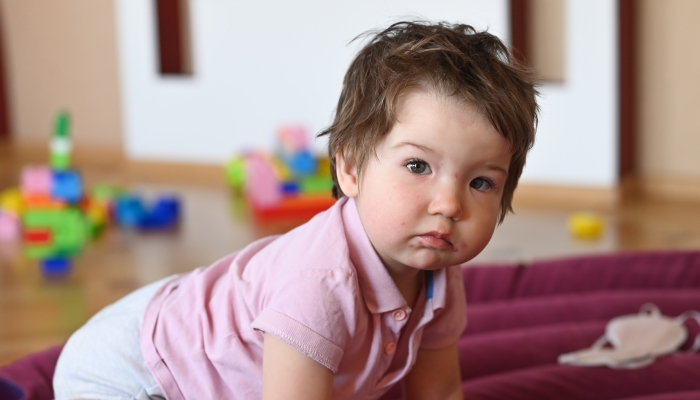
Why Is Herpes in Babies a Major Cause of Concern?
Herpes in babies can cause severe illness. While cold sores are inconvenient for an adult, they can be life threatening to an infant.
Herpes infections in babies can lead to:
- Liver failure
- Heart failure
- Blindness
- Seizures
- Deafness
- Lung Failure
Herpes simplex virus type 1
This is better known as oral herpes. About 70% of adults carry herpes simplex type 1. Once you have been infected with herpes, you carry it for life.
This doesn’t mean you are constantly infectious after you’ve had cold sores. Herpes is mostly spread while it’s causing symptoms. You are probably infectious if you develop an itch, pain, visible lesions, or other signs of active cold sores.
Herpes simplex virus type 2
Better known as genital herpes, this is most commonly spread by sexual contact. It can also spread from a mother to her baby during vaginal birth.
Genital herpes infection in mothers is associated with premature labor and low birth weight.
Herpes simplex 2 is not only dangerous for newborns. Women infected with genital herpes may be at higher risk of cervical cancer.
Recurrent herpes
Having recurrent herpes doesn’t mean you are getting re-infected. Unfortunately, cold sore treatment only controls the symptoms. Once you’re infected with the virus, you carry it forever.
Typically, stress and illness cause the virus to flare up. You might feel pain or itching around your mouth before cold sores develop. If you start treatment right away, you can prevent the sores from becoming severe.
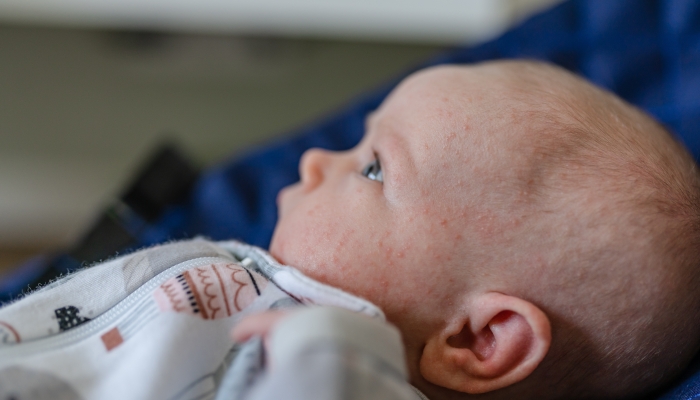
Baby Acne vs Herpes
It’s important to know the difference between baby acne and herpes. The following chart can help you determine which condition your baby has.
| Baby Acne | Herpes |
| Common | Rare |
| Does not harm your baby | Can make your baby very sick |
| Non-transmissible | Contagious |
| Small bumps on face, neck, and chest | Blisters and sores on lips and eyes |
| White pimples or blackheads | Inflamed sores with crusting |
| No signs of illness | Fever and fussiness |
When to Consult a Doctor
If you have had a cold sore and then notice any inflamed area on your baby’s skin, take them to the pediatrician right away.
Symptoms of herpes infection usually occur 12 days after exposure. You’ll need to monitor your baby closely for about two weeks after you get over a cold sore.
If your baby develops a rash around their lips or sores inside their mouth, you should see your pediatrician. They will be able to test your child to give the correct diagnosis and treatment.
FAQs
How does the doctor give a diagnosis of herpes?
When you take your child to the doctor with sores, they can perform several tests to find out the cause. For example, they might take samples of blood or drainage from the sores. The samples are then sent to a laboratory, and you can expect results within a day or two.
Can a dermatologist help me with my cold sores?
Both a dermatologist and family practice physician can diagnose and treat adult cold sores. They will both offer the same treatments—time and antiviral medication for severe cases.
Your infant should see a pediatrician if they develop cold sores. Since herpes can cause problems in their whole body, a pediatrician is the best choice.
Can I use at home treatments for cold sores in my older child?
Cold sores are less dangerous for older children. Children 12 months and older do not usually have severe complications from herpes infections.
For older kids, you can use home treatments to reduce pain and itching. Cold packs and popsicles can ease inflammation and pain.
You can also make a salt water rinse for your child to use. Just add ½ teaspoon of salt to 1 cup of warm water. Then, have your child swish the solution in their mouth for about 30 seconds and spit it out.
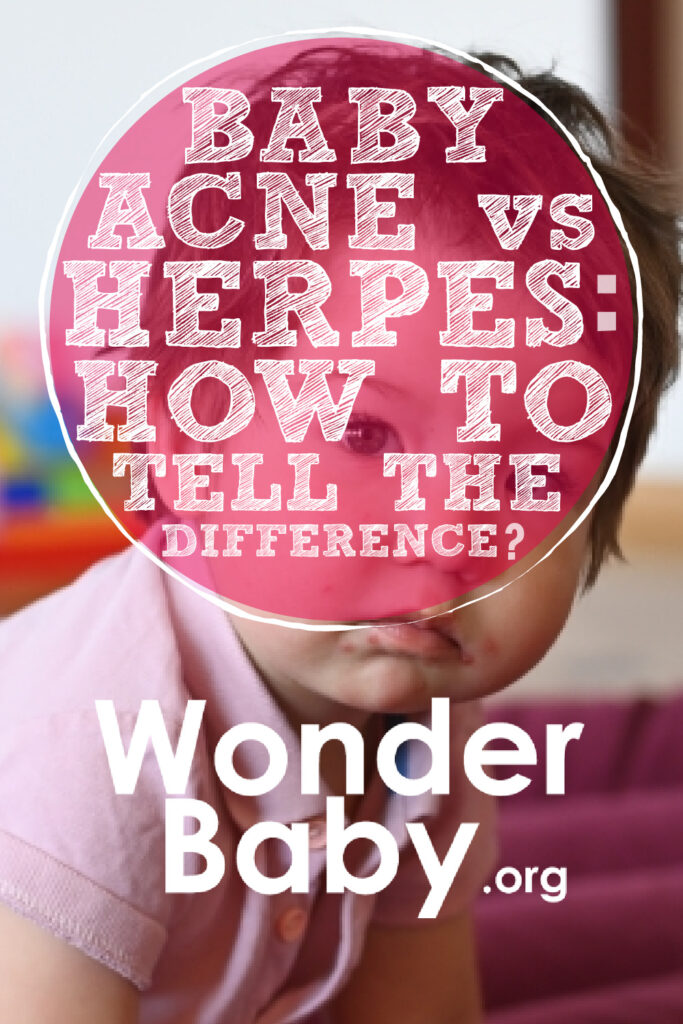
The information WonderBaby provides is not intended to be, and does not constitute, medical or other health advice or diagnosis and should not be used as such. Always consult with a qualified medical professional about your specific circumstances.
Related Posts

Eye Conditions and Syndromes, Visual Impairment
Neuralink Announces Plans to Restore Sight to the Blind with Brain Chip
Elon Musk’s company Neuralink has announced plans to begin human trials of its new “Blindsight” brain chip by the end of 2025.
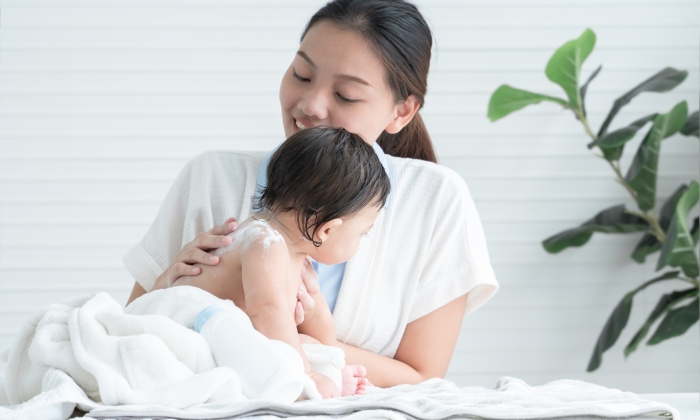
Health & Nutrition
Can Baby Skin Care Products Expire?
Is that forgotten tube of diaper rash cream still safe to use? Learn more about the expiration dates of popular skin care products for infants.

Health & Nutrition
Boosting Immunity in Kids: 3 Tips for a Healthy Winter
Parents can help boost their kids’ immunity during cold and flu season by maintaining healthy eating, sleeping, and exercising habits in the winter.